National Telephone Day is a holiday that is celebrated annually on April 25th. National Telephone Day is dedicated to celebrating the invention and history of the telephone, which is a device that has had a significant impact on communication and changed the world. It is a time to appreciate the many ways that the telephone has made our lives easier, more efficient, and connected us to people and places all over the world.
The telephone was invented by Alexander Graham Bell in 1876, and it quickly became an essential tool for communication in both personal and business settings. Over the years, the telephone has evolved from a simple device with a rotary dial to the modern-day smartphone, which is capable of doing much more than just making phone calls. Today, the telephone is an integral part of our daily lives, and we rely on it to stay in touch with friends and family, conduct business, and stay informed about the world around us.
To celebrate National Telephone Day, people can take some time to reflect on the history and evolution of the telephone, share stories about how it has impacted their lives, and appreciate the convenience and benefits that this device has provided.
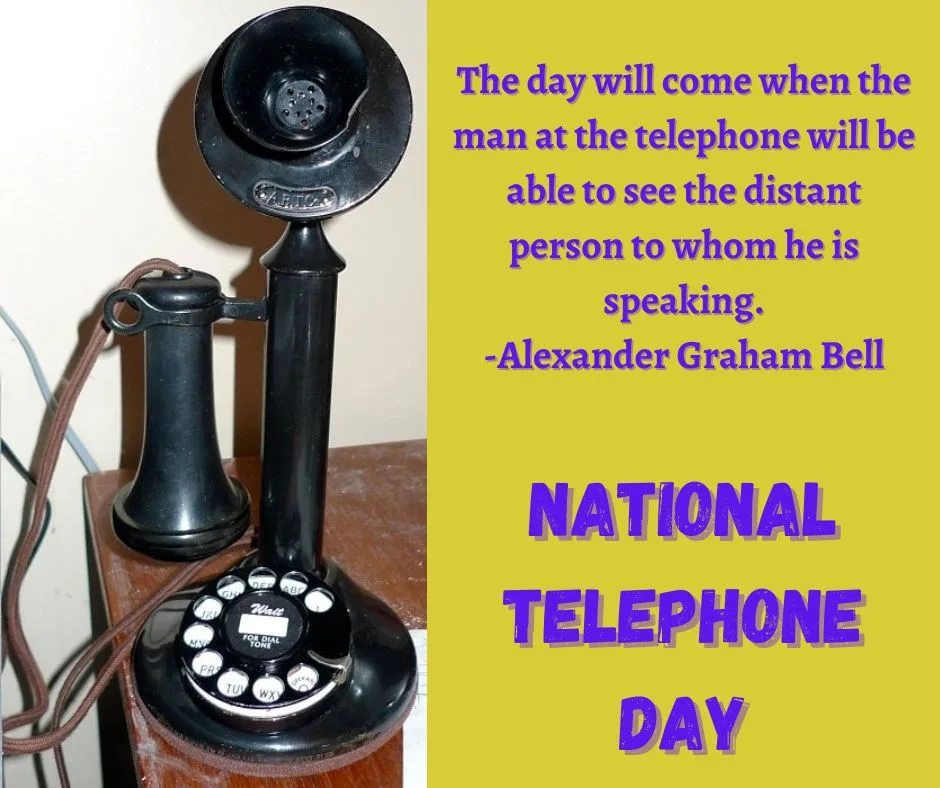
History of National Telephone Day
National Telephone Day is an annual holiday that is celebrated on April 25th to honor the invention and impact of the telephone. This device has revolutionized the way we communicate with one another and has made the world a smaller place.
The telephone was invented by Alexander Graham Bell in 1876. Bell, a Scottish-born scientist and inventor, filed his patent for the telephone on March 7, 1876. His invention was the first practical device for transmitting speech over a wire. Bell’s invention was a significant breakthrough in the field of communication, and it paved the way for the modern telephone industry.
Initially, the telephone was a luxury item and was only available to wealthy individuals and businesses. However, over time, it became more widely available and affordable. The first long-distance telephone line was established in 1885, connecting Boston and New York City. This allowed people to communicate with one another over longer distances and made it easier for businesses to conduct transactions with customers in different cities.
In the early 1900s, the telephone became a household item, and many families had a telephone in their home. This allowed people to communicate with one another more easily, and it made it possible for families to stay connected, even if they were far apart.
The invention of the telephone also had a significant impact on business and commerce. It made it possible for companies to communicate with their customers and suppliers more efficiently, and it helped to streamline business operations. Today, the telephone is an essential tool for businesses of all sizes, and it is used to conduct transactions, communicate with customers, and collaborate with colleagues.
In recent years, the telephone has evolved from a simple device with a rotary dial to a high-tech gadget capable of doing much more than just making phone calls. The advent of smartphones has made it possible for people to access the internet, send and receive email, and use a variety of apps, all from their mobile device.
National Telephone Day Activities
National Telephone Dayis a great opportunity to celebrate the invention and history of the telephone, and there are many fun and educational activities that you can do to mark the occasion. Here are some ideas:
- Learn about the history of the telephone: Read up on the invention and history of the telephone. You can find information online or at your local library.
- Play telephone: Get a group of friends or family together and play the classic game of telephone. It’s a fun way to demonstrate the importance of clear communication.
- Make a phone call: Take some time to call a friend or family member you haven’t spoken to in a while. It’s a great way to catch up and celebrate the holiday.
- Take a tour of a telephone museum: If you live near a museum dedicated to the history of the telephone, take a tour and learn more about the device that changed the world.
- Watch a movie or TV show featuring the telephone: From classic movies like “Dial M for Murder” to TV shows like “Mad Men,” there are many examples of the telephone being used in popular culture.
- Explore telephone technology: Learn about the latest developments in telephone technology, such as smartphones and voice assistants like Siri or Alexa.
- Create a telephone craft: Make a craft that features the telephone. For example, you could create a telephone-shaped picture frame or a telephone-themed scrapbook page.
- Share your telephone story: Take to social media and share a story about how the telephone has impacted your life. It could be a funny story, a heartwarming memory, or a practical use of the telephone.
- Learn about telephone etiquette: Refresh your knowledge of proper telephone etiquette, such as answering calls promptly and speaking clearly.
- Donate a phone: Consider donating an old phone to a charity or organization that can use it to help others, such as a domestic violence shelter or a program that provides phones for low-income families.
National Telephone Day related Facts
Here are some interesting facts about National Telephone Day:
- Alexander Graham Bell made the first telephone call on March 10, 1876, when he spoke the words, “Mr. Watson, come here. I want to see you.” to his assistant, Thomas A. Watson, who was in another room.
- The first commercial telephone exchange was established in New Haven, Connecticut, in 1878, and it had 12 subscribers.
- The first long-distance telephone line was established in 1885, connecting Boston and New York City.
- The first public payphone was installed in 1889 in Hartford, Connecticut.
- The first mobile phone call was made in 1947 by Bell Labs engineer Martin Cooper, who called a rival company’s research head.
- In 1973, the first mobile phone call made on a handheld device was placed by Motorola engineer Martin Cooper, who called his rival at AT&T from the streets of New York City.
- The first text message was sent in 1992 from a computer to a mobile phone, and it read “Merry Christmas.”
- The first iPhone was released in 2007, and it revolutionized the mobile phone industry with its touch screen and app capabilities.
- The world’s most expensive phone is the iPhone 5 Black Diamond, which is worth $15.3 million and is covered in gold and diamonds.
- The emergency number, 911, was created in 1968, and it has since become the standard emergency number in the United States and other countries.
- The first phone book was published in New Haven, Connecticut, in 1878, and it listed just 50 names.
- The first transcontinental telephone call was made in 1915 between Alexander Graham Bell in New York City and Thomas A. Watson in San Francisco.
- The first answering machine was invented in 1935 by Willy Müller in Germany.
- The first video call was made in 1964 at the World’s Fair in New York City, using a device called the Picturephone.
- The first cordless phone was introduced in 1965 by Bell System, and it had a range of just 100 feet.
- The first touch-tone phone was introduced in 1963, allowing users to dial a number by pressing buttons instead of using a rotary dial.
- The first cell phone was commercially available in 1983, and it cost $3,995.
- The Nokia 1100 is the world’s best-selling phone, with over 250 million units sold.
- In Japan, it is considered rude to talk on a cell phone in public places such as trains and buses.
- The phrase “wrong number” was first used in 1896, and it referred to the situation when someone dialed the wrong phone number.
National Telephone Day Images
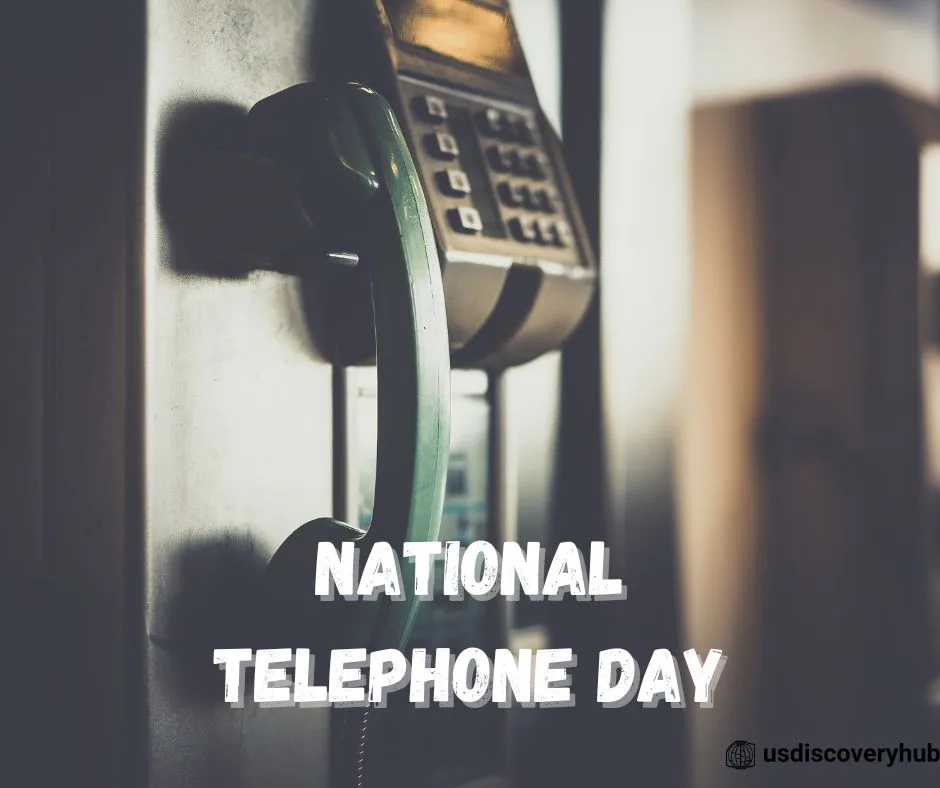
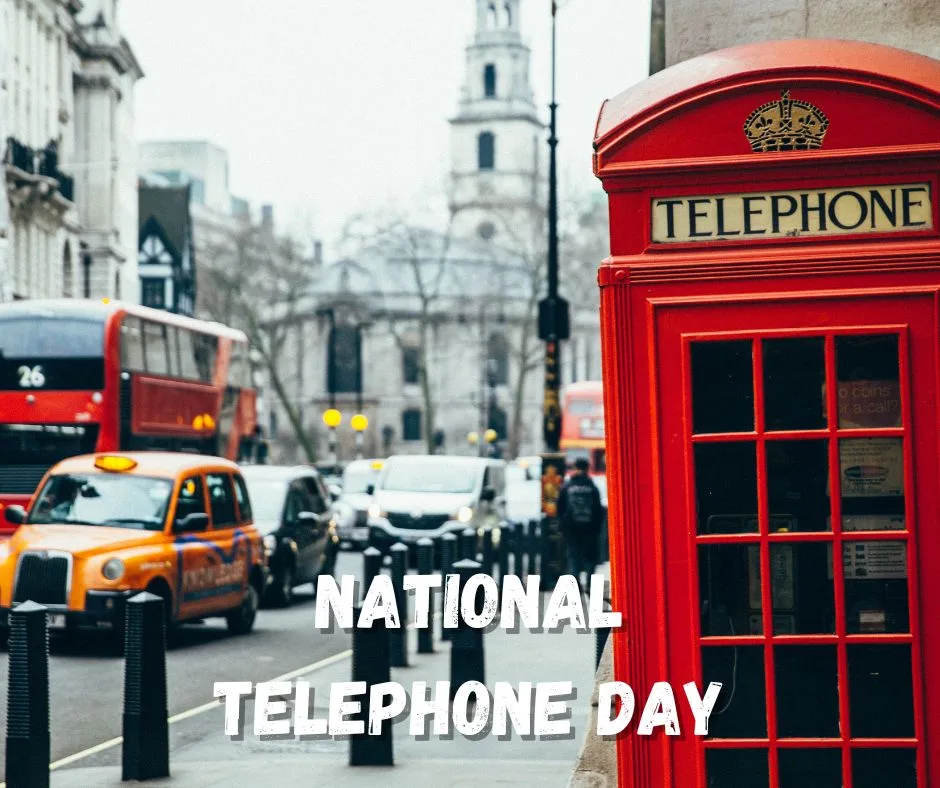
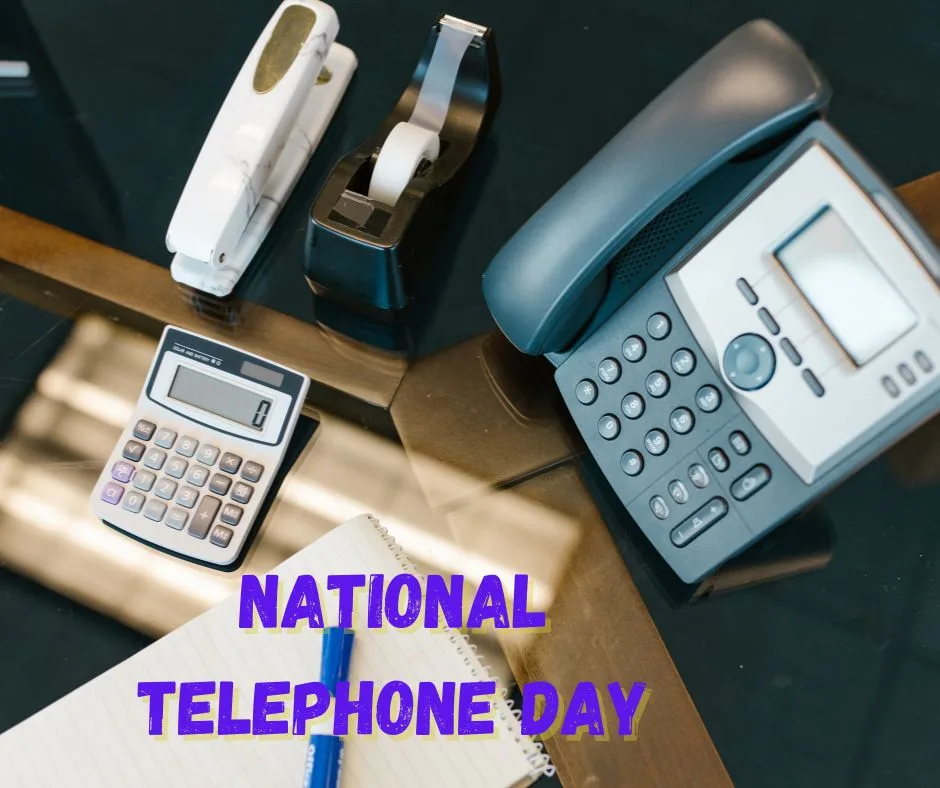
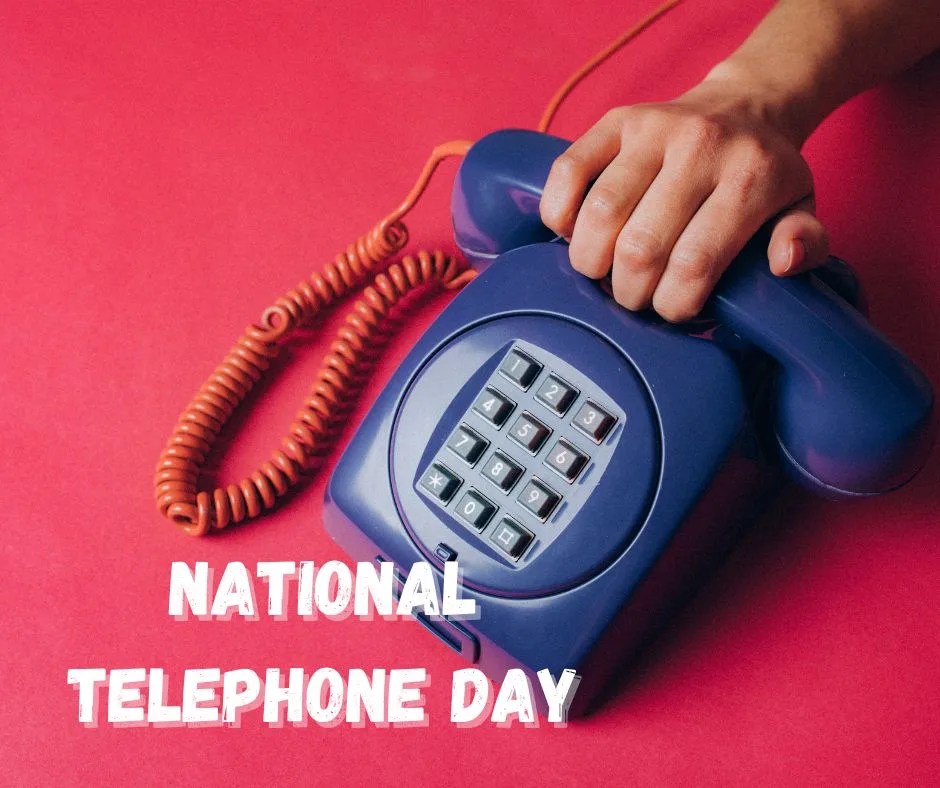
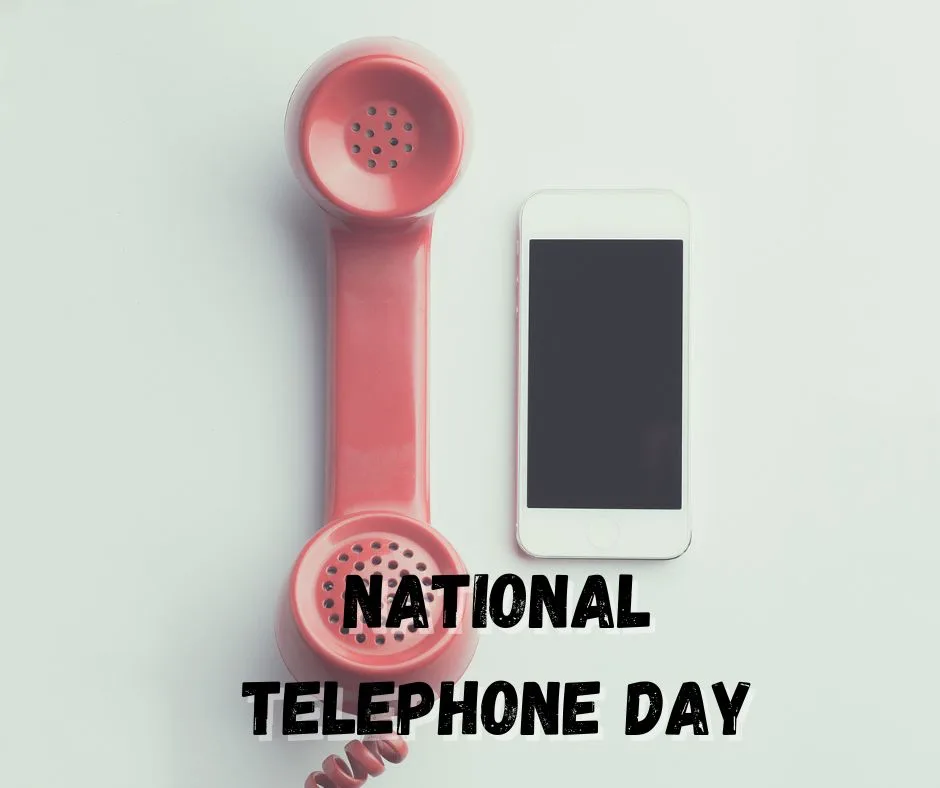
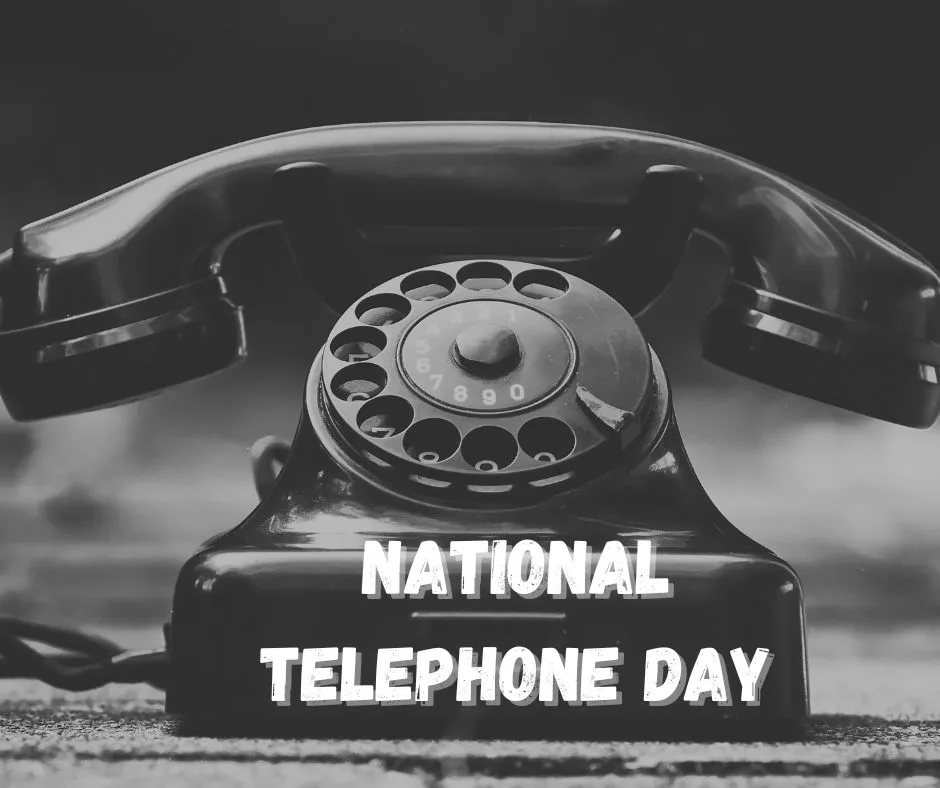
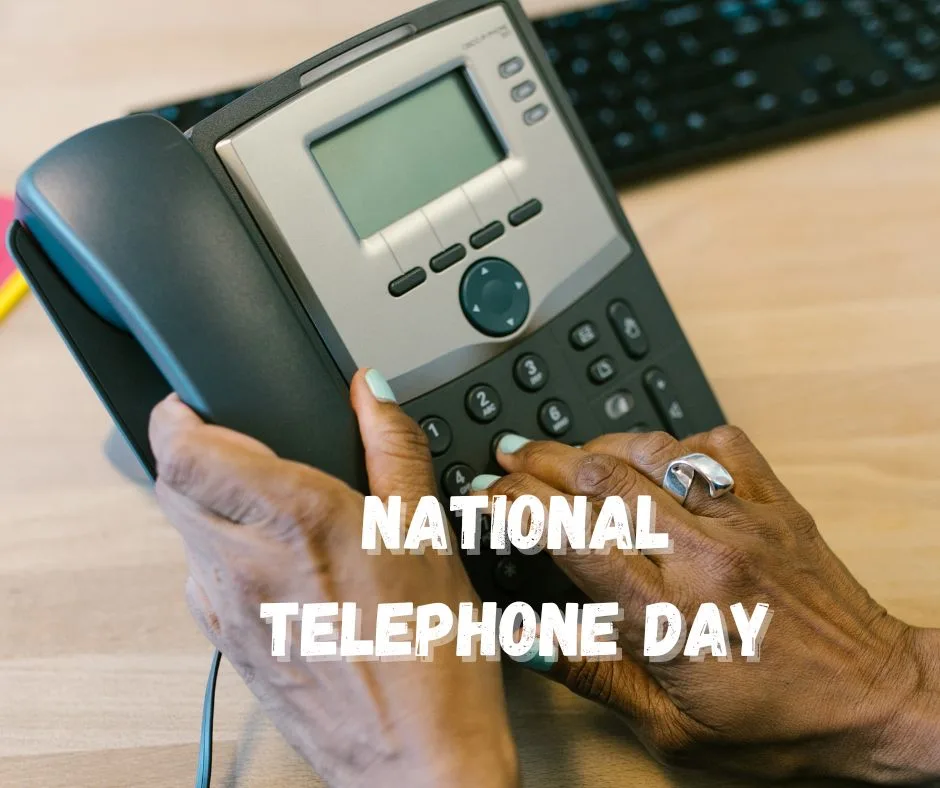
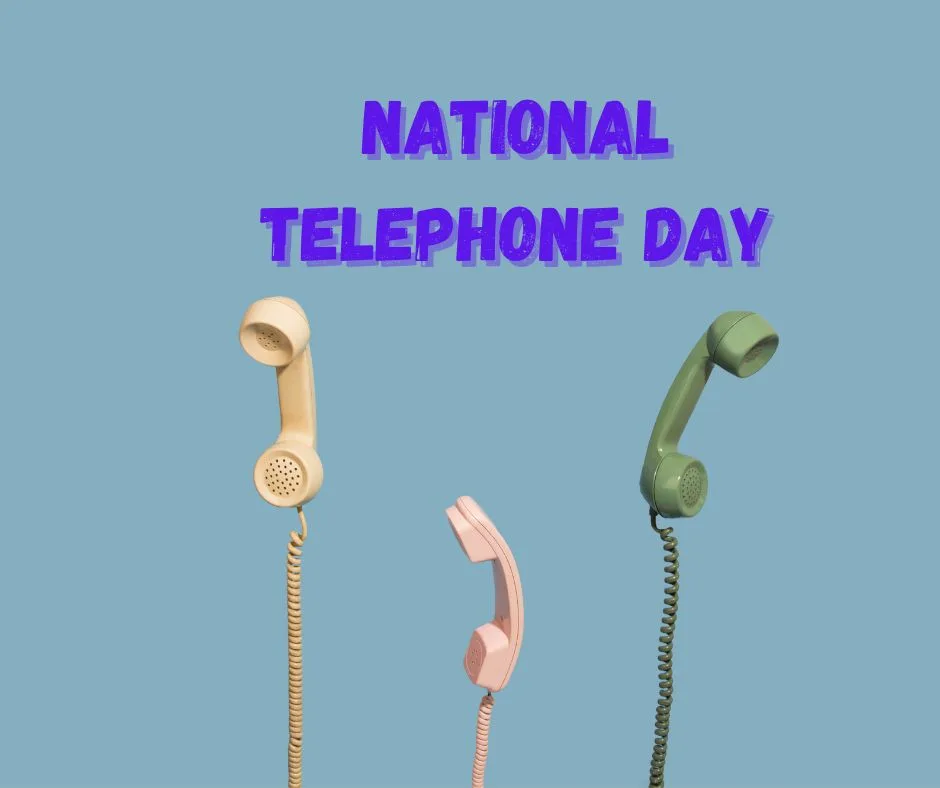

The evolution of the Telephone
The telephone has come a long way since its invention by Alexander Graham Bell in 1876. Here’s a brief history of the evolution of the telephone:
- Early telephones: The first telephones were simple devices that transmitted sound over a wire. They had no dialing mechanism and were operated by human operators who manually connected calls.
- Rotary phones: The rotary phone was introduced in the early 1900s and became the standard for many decades. These phones had a circular dial with numbered holes that corresponded to the digits in a phone number. Users would rotate the dial to the appropriate number to make a call.
- Touch-tone phones: The touch-tone phone was introduced in the 1960s and allowed users to dial a number by pressing buttons instead of rotating a dial. The touch-tone system also introduced the use of dual-tone multi-frequency (DTMF) signaling, which allowed for the transmission of more complex data over the phone line.
- Cordless phones: The first cordless phone was introduced in 1965 by Bell System. These phones used radio waves to transmit signals instead of a physical wire, allowing users to move around freely while on a call.
- Mobile phones: The first mobile phone was commercially available in 1983 and was designed for use in cars. It was a bulky device that cost $3,995. Over the years, mobile phones became smaller and more affordable, and by the 2000s, they had become a ubiquitous part of everyday life.
- Smartphones: The first smartphone was introduced in 1993 by IBM, but it wasn’t until the introduction of the iPhone in 2007 that smartphones became mainstream. Smartphones allowed users to access the internet, send text messages, take photos, and run a wide variety of apps, making them much more than just a device for making phone calls.
- VoIP: Voice over Internet Protocol (VoIP) is a technology that allows voice calls to be made over the internet instead of a traditional phone line. Services like Skype, WhatsApp, and Zoom have made it possible to make voice and video calls from anywhere in the world with an internet connection.
The evolution of the telephone has been driven by technological advancements, changes in consumer behavior, and the need to make communication more convenient and accessible. Today, the telephone is just one of many ways we communicate with each other, but it remains an essential tool for connecting people around the world.
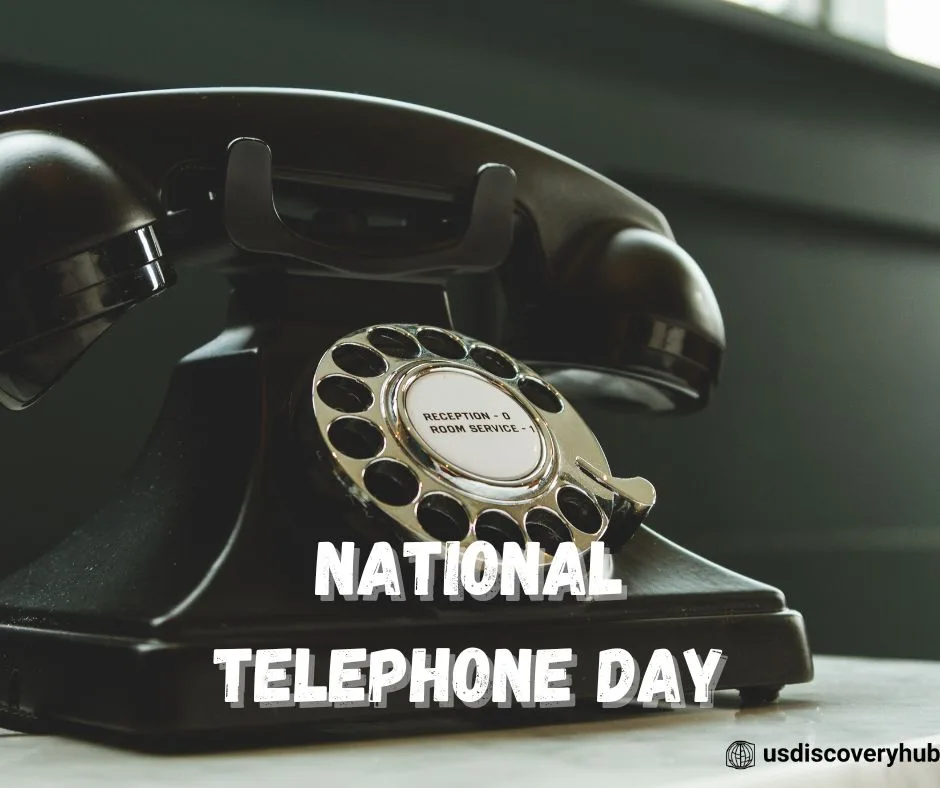
The impact of the Telephone on society
The telephone has had a profound impact on society since its invention in 1876. Alexander Graham Bell’s invention of the telephone revolutionized communication, making it easier and faster for people to connect with one another. Here are some of the ways in which the telephone has impacted society:
- Improved communication: Before the telephone, people had to rely on letters or telegrams to communicate over long distances. The telephone made it possible to have real-time conversations with people in other parts of the world, which improved communication and made the world feel smaller.
- Increased social connectivity: The telephone allowed people to stay in touch with friends and family more easily, even if they lived far away. This increased social connectivity helped to strengthen relationships and keep people connected.
- Enhanced business communication: The telephone revolutionized business communication, making it easier for companies to communicate with customers and suppliers. This improved efficiency and helped businesses to grow and prosper.
- Created new industries and job opportunities: The telephone industry has created a significant number of jobs, from telephone operators to telephone technicians to salespeople. The telephone also led to the creation of new industries, such as telemarketing and call centers.
- Improved emergency response: The telephone has played a critical role in emergency response. People can call for help during emergencies, such as fires or medical emergencies, and get a rapid response from emergency services.
- Increased efficiency: The telephone has increased efficiency in many aspects of life, from making appointments to conducting business to staying in touch with loved ones. This has saved time and made life more convenient.
- Changed the way we communicate: The telephone has changed the way we communicate with one another. It has made it easier to have conversations and share information, and has led to the development of new forms of communication, such as texting and video conferencing.
In conclusion, the telephone has had a significant impact on society since its invention. It has improved communication, increased social connectivity, enhanced business communication, created new industries and job opportunities, improved emergency response, increased efficiency, and changed the way we communicate. The telephone remains an essential tool for communication and will continue to shape society in the years to come.
The cultural significance of the Telephone
The telephone has had a significant cultural impact on society since its invention in 1876. It has been portrayed in movies, TV shows, and literature, and has become a symbol of communication, connection, and even intimacy.
In movies and TV shows, the telephone has been used as a tool for suspense, drama, and comedy. Famous examples include the iconic scene from Alfred Hitchcock’s Psycho, where Janet Leigh’s character is stabbed in the shower while the phone rings in the background. In The Godfather, the telephone was used as a means for conducting business, as well as a way to communicate with loved ones. In the hit TV series Friends, the characters frequently communicated with one another over the phone, often leading to humorous misunderstandings and mishaps.
The telephone has also been featured prominently in literature, with authors using it to explore themes of connection, isolation, and intimacy. In Tennessee Williams’ play A Streetcar Named Desire, the telephone is used to convey the character’s desperation and isolation, while in Raymond Carver’s short story “What We Talk About When We Talk About Love,” the characters use the telephone to discuss their relationships and search for meaning in their lives.
The cultural significance of the telephone extends beyond its portrayal in movies, TV shows, and literature. The telephone has become a symbol of communication, connection, and intimacy. It has allowed people to stay in touch with loved ones, even when they are far apart, and has enabled people to build and maintain relationships over long distances.
Furthermore, the telephone has played a crucial role in political and social movements throughout history. For example, during the civil rights movement in the United States, the telephone was used to organize protests and coordinate actions, as well as to spread information and raise awareness about social injustices.
The cultural significance of the telephone is far-reaching and multifaceted. It has been portrayed in movies, TV shows, and literature as a tool for drama, suspense, and comedy, and has become a symbol of communication, connection, and intimacy. The telephone has also played an important role in political and social movements throughout history, and has enabled people to organize and mobilize for change.

The importance of the telephone in business
The telephone is an essential tool for businesses of all sizes. It has revolutionized the way we communicate with customers, suppliers, and colleagues, and it has had a significant impact on the way we conduct business. Here are some of the ways in which the telephone is important in business:
- Customer communication: The telephone is a primary means of communication between businesses and their customers. It is used to answer customer inquiries, resolve issues, and provide customer support. By using the telephone, businesses can establish a personal connection with their customers, which can improve customer satisfaction and loyalty.
- Sales and marketing: The telephone is also an important tool for sales and marketing. Sales representatives use the telephone to reach out to potential customers and to follow up on leads. Telemarketing and telesales are also common uses of the telephone in business.
- Collaboration: The telephone is used for collaboration between colleagues, particularly in businesses with multiple locations or remote workers. It allows team members to communicate in real-time, which can improve productivity and efficiency.
- Meetings: The telephone is often used for conference calls and virtual meetings. This allows participants to connect from different locations and can save time and money compared to in-person meetings.
- Crisis management: In times of crisis, such as a product recall or a natural disaster, the telephone is an important tool for communication. It allows businesses to quickly reach out to customers and stakeholders to provide information and updates.
- Remote work: The COVID-19 pandemic has highlighted the importance of the telephone in enabling remote work. With many employees working from home, the telephone has become a primary means of communication between colleagues, customers, and suppliers.
In conclusion, the telephone is a critical tool for businesses in today’s world. It allows businesses to communicate with customers, collaborate with colleagues, and conduct sales and marketing activities. As technology continues to evolve, the telephone will remain an essential part of the business communication toolkit.
The future of the telephone
The telephone has come a long way since Alexander Graham Bell invented it in 1876. From rotary phones to smartphones, the telephone has undergone many changes and innovations over the years. However, the future of the telephone is still evolving, and there are several trends that are shaping the future of this essential tool.
- 5G technology: The advent of 5G technology promises to revolutionize the way we use the telephone. With faster data speeds and improved connectivity, 5G will enable new applications and services that were previously not possible. This will open up new opportunities for businesses and consumers alike.
- Artificial intelligence: The integration of artificial intelligence (AI) into telephony systems will enable smarter and more efficient communication. AI-powered chatbots and voice assistants will be able to handle routine customer inquiries and support requests, freeing up human resources for more complex tasks.
- Virtual and augmented reality: Virtual and augmented reality technologies will enable more immersive communication experiences. This will be particularly useful in areas such as teleconferencing, where participants will be able to feel like they are in the same room even if they are physically located in different parts of the world.
- Internet of Things (IoT): The integration of telephony systems with IoT devices will enable new applications and services. For example, smart home devices could be controlled using a telephone app, and businesses could use telephony systems to track the location of assets in real-time.
- Enhanced security: With the increasing prevalence of cyber threats, security will continue to be a major concern for telephony systems. New technologies such as blockchain and biometrics will be integrated into telephony systems to enhance security and protect against fraud and data breaches.
In conclusion, the future of the telephone is exciting and full of potential. The integration of new technologies such as 5G, AI, and IoT will enable new applications and services, and enhance the way we communicate. As businesses and consumers continue to rely on the telephone for communication, telephony systems will continue to evolve and adapt to meet changing needs and expectations.
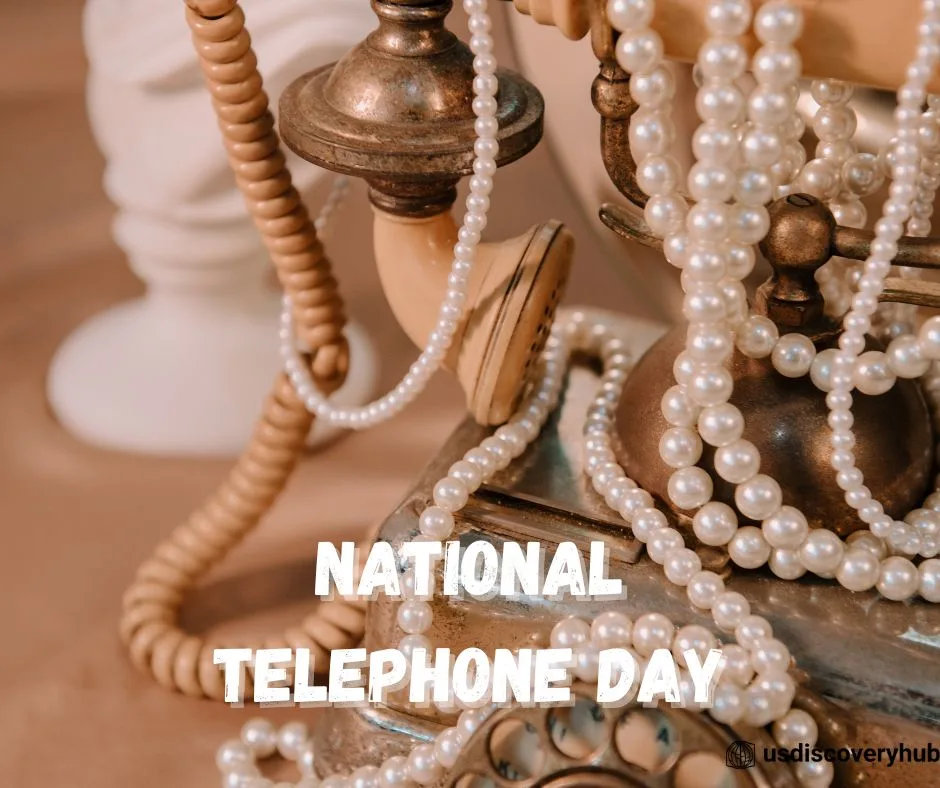
The benefits and drawbacks of the telephone
The telephone is an invention that has transformed the way we communicate with each other. However, like any technology, it has its benefits and drawbacks. In this article, we will explore the advantages and disadvantages of the telephone.
Benefits:
- Instant communication: One of the main benefits of the telephone is that it allows us to communicate with others instantly. Whether it’s for personal or business reasons, we can connect with people regardless of location, and have a conversation in real-time.
- Convenience: The telephone is a convenient tool, as it allows us to make calls from wherever we are, whether it’s from home, the office, or while on the go.
- Increased productivity: The telephone has made it easier for businesses to communicate with their customers, suppliers, and employees, which has increased productivity and efficiency in the workplace.
- Emergency situations: The telephone can be a lifesaver in emergency situations. We can quickly call for help or notify authorities if we need assistance.
- Cost-effective: With the advancement of technology, it has become more affordable to make long-distance calls, making it easier to keep in touch with family and friends who live far away.
Drawbacks:
- Lack of personal touch: Unlike face-to-face communication, the telephone lacks the personal touch that helps build relationships. This can lead to misunderstandings and miscommunications.
- Interruptions: The telephone can be a source of constant interruptions and distractions, which can affect productivity and focus.
- Misuse: The telephone can be misused for prank calls, telemarketing, and other unethical practices.
- Dependence: The ease of use and convenience of the telephone can make us overly dependent on it, leading to a lack of face-to-face communication skills and an over-reliance on technology.
- Privacy concerns: With the rise of telemarketing and scam calls, there are privacy concerns associated with sharing personal information over the phone.
In conclusion, while the telephone has revolutionized communication and has many benefits, it also has its drawbacks. It is important to use the telephone responsibly, be aware of its limitations, and not become overly dependent on it. We should continue to explore new ways of communication while also preserving the importance of personal interaction.
The role of the telephone in modern-day communication
The telephone remains a critical component of modern-day communication despite the proliferation of social media, email, and instant messaging platforms. While new technologies have emerged over the years, the telephone’s versatility, reliability, and ease of use have made it a communication tool that is still in high demand.
One of the most significant benefits of the telephone is its ability to connect people in real-time, regardless of their location. Voice communication over the telephone is still the preferred method for many people when it comes to conveying information or emotions. Hearing someone’s voice on the phone can help establish a personal connection and convey a message more effectively than an email or text message.
Furthermore, the telephone remains the go-to communication tool for businesses worldwide. Whether it’s a customer service call center or a sales team, the telephone is still the most efficient way to connect with customers and conduct business. The ability to have a live conversation in real-time helps to build trust and strengthen relationships, leading to better customer satisfaction and increased revenue for businesses.
While new technologies have emerged that have shifted the way we communicate, the telephone has remained an essential tool for emergencies. In times of crisis, the telephone is often the quickest way to reach someone who can provide help or assistance. It’s also an effective way to communicate with loved ones during emergencies, whether it’s a natural disaster, a medical emergency, or any other urgent situation.
Finally, the telephone has adapted to changing times and needs, with the introduction of new features such as video calls and messaging services. The ability to see and hear someone on a video call has brought people closer together, even when they are thousands of miles apart. Messaging services have also become an integral part of modern-day communication, allowing people to send text messages, photos, and videos quickly.
In conclusion, while the telephone may no longer be the primary tool for everyday communication, it remains a critical component of modern-day communication. Its ability to connect people in real-time, its reliability, and its adaptability have kept it relevant despite the emergence of new technologies.
The importance of telephone etiquette
The importance of telephone etiquette
Telephone etiquette is an essential aspect of communication, whether you are speaking with friends, family members, colleagues, or customers. Proper telephone etiquette can make a significant difference in how you are perceived by others and can help to ensure that your message is conveyed clearly and effectively. Here are some reasons why telephone etiquette is so important:
- It creates a positive impression: When you answer the phone in a polite and professional manner, it creates a positive impression and shows that you value the person on the other end of the line. This can help to build trust and establish a good relationship.
- It ensures effective communication: When you use proper telephone etiquette, you are more likely to convey your message clearly and effectively. This can help to avoid misunderstandings and ensure that your message is received as intended.
- It shows respect: Using proper telephone etiquette shows that you respect the person on the other end of the line and value their time and attention. This can help to build stronger relationships and improve communication.
- It promotes professionalism: When you use proper telephone etiquette, you demonstrate a level of professionalism that can be important in business and other formal settings. This can help to establish credibility and trust with clients, customers, and colleagues.
- It can help to resolve conflicts: When you use proper telephone etiquette, you are more likely to be able to resolve conflicts and misunderstandings in a calm and professional manner. This can help to avoid escalation and maintain positive relationships.
Some tips for proper telephone etiquette include:
- Answering the phone promptly and greeting the caller politely
- Identifying yourself and your company (if applicable)
- Speaking clearly and slowly
- Listening carefully to the caller and responding appropriately
- Using proper grammar and avoiding slang or jargon
- Avoiding distractions or interruptions while on the phone
- Asking for permission before placing a caller on hold or transferring them
- Thanking the caller for their time and for calling.
Overall, proper telephone etiquette is an important aspect of effective communication and can help to establish positive relationships with others. By using these tips, you can ensure that your telephone interactions are professional, respectful, and effective.
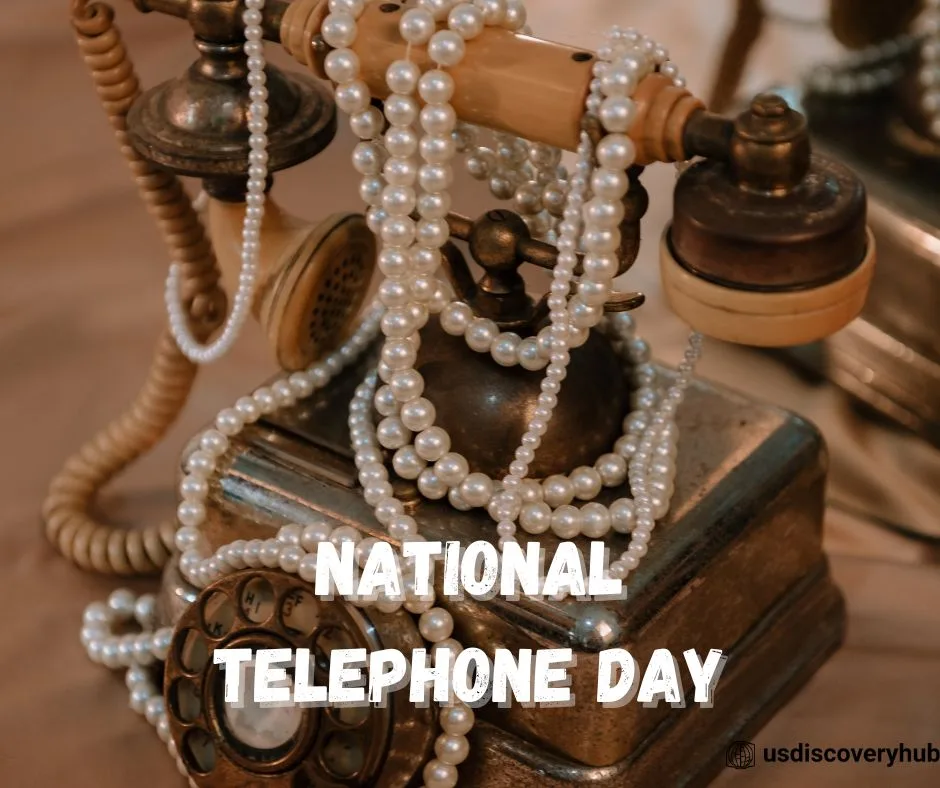
The global impact of the telephone
The invention of the telephone has had a profound impact on communication worldwide. It has brought people together, bridged distances, and created a sense of global community. Today, the telephone is an essential tool for people all over the world, and it has changed the way we connect with one another.
One of the most significant impacts of the telephone has been on international communication. Before the telephone, it was difficult and expensive to communicate with people in other countries. Letters and telegrams were the primary means of communication, and they often took weeks or even months to arrive. The telephone made it possible for people to have real-time conversations with friends, family, and colleagues, no matter where they were in the world.
The telephone has also had a significant impact on business and commerce. It has made it easier for companies to conduct business with customers and suppliers in different parts of the world. The telephone has enabled businesses to communicate more efficiently and has helped to speed up the process of international trade.
In addition to its impact on communication and business, the telephone has also had a significant social impact. It has helped to break down barriers between people and has created a sense of global community. Today, people all over the world can connect with one another and share their thoughts, ideas, and experiences through the telephone.
The telephone has also played an important role in emergency situations. It has enabled people to call for help in times of need, and it has been instrumental in coordinating relief efforts during natural disasters and other crises.
Finally, the telephone has played a crucial role in shaping the way we think about communication and technology. It has paved the way for other technological advancements, such as the internet and mobile devices, and it has helped to create a world that is more connected and accessible than ever before.
In conclusion, the global impact of the telephone cannot be overstated. It has revolutionized the way we communicate, conduct business, and connect with one another, and it has helped to create a more connected and united world. The telephone has played a vital role in shaping the way we live our lives, and it will undoubtedly continue to do so in the future.
National Telephone Day FAQs
Why do we celebrate telephone day?
We celebrate National Telephone Day to honor the invention and impact of the telephone, which has revolutionized the way we communicate with one another and has made the world a smaller place. It is a time to reflect on the history of the telephone, appreciate its many benefits, and celebrate the ways in which it has made our lives easier and more connected.
When was the telephone invented?
The telephone was invented by Alexander Graham Bell in 1876. Bell, a Scottish-born scientist and inventor, filed his patent for the telephone on March 7, 1876. His invention was the first practical device for transmitting speech over a wire. The telephone was a significant breakthrough in the field of communication, and it paved the way for the modern telephone industry.
What was the telephone first word?
The first words ever spoken on the telephone were by Alexander Graham Bell to his assistant, Thomas Watson. Bell spoke the now-famous phrase, “Mr. Watson, come here, I want to see you.” Watson was in another room at the time, and he heard Bell’s voice over the telephone. This was a significant moment in history, as it demonstrated that the telephone was a practical device for transmitting speech over a wire.
Why is the telephone important?
The telephone is important because it has revolutionized the way we communicate with one another. It has made it easier for people to stay connected with one another, conduct business, and collaborate with colleagues. The invention of the telephone paved the way for the modern telecommunications industry, and it has had a significant impact on business, commerce, and society as a whole. The telephone has made it possible for people to communicate with one another over longer distances, and it has helped to streamline business operations. Today, the telephone is an essential tool for businesses of all sizes, and it is used to conduct transactions, communicate with customers, and collaborate with colleagues.
What was the telephone first called?
The telephone was first called the “speaking telegraph” by its inventor, Alexander Graham Bell. Bell used this term in his first public demonstration of the device in 1876. However, the term “telephone” soon became more commonly used, and it eventually replaced the term “speaking telegraph.” The word “telephone” is derived from the Greek words “tele” (meaning “far”) and “phone” (meaning “sound” or “voice”), which accurately describes the device’s ability to transmit speech over long distances.
Where was the first telephone call?
The first telephone call was made by Alexander Graham Bell to his assistant, Thomas Watson, on March 10, 1876, in Boston, Massachusetts. Bell was in one room, and Watson was in another, about 20 feet away. Bell spoke the now-famous words, “Mr. Watson, come here, I want to see you,” and Watson heard him over the telephone. This was a historic moment, as it demonstrated that the telephone was a practical device for transmitting speech over a wire.
What was the first mobile telephone?
The first mobile telephone was the Motorola DynaTAC 8000X, which was introduced in 1983. The DynaTAC 8000X was a handheld device that was about the size of a brick and weighed around 2.5 pounds. It was the first commercially available mobile phone and was a significant technological advancement in the telecommunications industry. The DynaTAC 8000X could only make phone calls and had a limited battery life of about 30 minutes of talk time, but it paved the way for future mobile devices that would have more advanced features and capabilities.
Who first said hello on the telephone?
The word “hello” was not commonly used as a greeting when the telephone was first invented, and it was not until later that it became a popular way to answer the phone. The first recorded use of the word “hello” as a telephone greeting was by Thomas Edison, the inventor and scientist, in 1877. Edison suggested the word as a standard greeting when answering the phone, and it soon caught on. Prior to the use of “hello,” people would often say “ahoy” or “hoy-hoy” as a greeting when answering the phone.
What is the oldest type of telephone?
The oldest type of telephone is the candlestick telephone, which was introduced in the late 1800s and remained popular until the 1920s. The candlestick telephone was named for its distinctive shape, which resembled a candlestick holder. It was a stand-alone device that consisted of a transmitter mounted on a vertical stem, with a receiver held to the ear by a separate handpiece. The candlestick telephone was a significant improvement over earlier telephones, which were large and cumbersome, and it became a popular fixture in homes and businesses around the world.